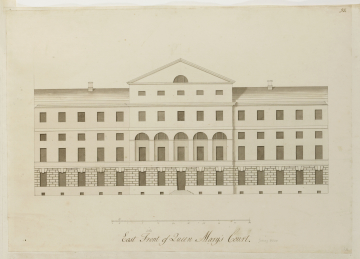Scale
10 feet to 17/20 inch
Inscribed
In brown ink in unidentified hand, beneath scale bar, East Front of Queen Mary's Court; Front struck out in pencil in C19 hand and changed to side, and facing WEST added at end; and with numbering on scale bar; and in ink in C19 hand at top right, 33.
Signed and dated
Medium and dimensions
Pen and grey ink over graphite under-drawing, with grey wash; on laid paper, laid down; 340 x 477
Hand
Unidentified hand in office of Thomas Ripley
Watermark
Countermark: IV
Notes
The courtyard elevation of the east range of Queen Mary's Court is identical in design to the east-facing elevation (the inscription at the bottom of the sheet is in error). The only differences are in details of the elevation: the omission of dressings around the windows of the central pavilion, the introduction of a Diocletian window in the pediment, and the absence of basement doors in the flanking ranges. Ripley's source for his central feature may have been Palladio's Villa Godi, which has a three-bay arched loggia and a roof gable that rises above the slopes on each side (see Quattro Libri, Book II, p. 65).
Literature
Axel Klausmeier, Thomas Ripley, Architekt: Fallstudie einer Karriere im Royal Office of the King's Works im Zeitalter des Neopalladianismus, Frankfurt am Main, 2000, pp. 113-24 Not in Wren Society
Level
Drawing
Digitisation of the Drawings Collection has been made possible through the generosity of the Leon Levy Foundation
Sir John Soane's collection includes some 30,000 architectural,
design and topographical drawings which is a very important resource for
scholars worldwide. His was the first architect’s collection to attempt to
preserve the best in design for the architectural profession in the future, and
it did so by assembling as exemplars surviving drawings by great Renaissance
masters and by the leading architects in Britain in the 17th and 18th centuries
and his near contemporaries such as Sir William Chambers, Robert Adam and
George Dance the Younger. These drawings sit side by side with 9,000 drawings
in Soane’s own hand or those of the pupils in his office, covering his early
work as a student, his time in Italy and the drawings produced in the course of
his architectural practice from 1780 until the 1830s.
Browse (via the vertical menu to the left) and search results for Drawings include a mixture of
Concise catalogue records – drawn from an outline list of the collection – and
fuller records where drawings have been catalogued in more detail (an ongoing
process).


